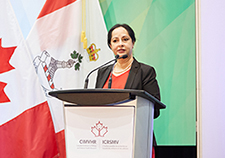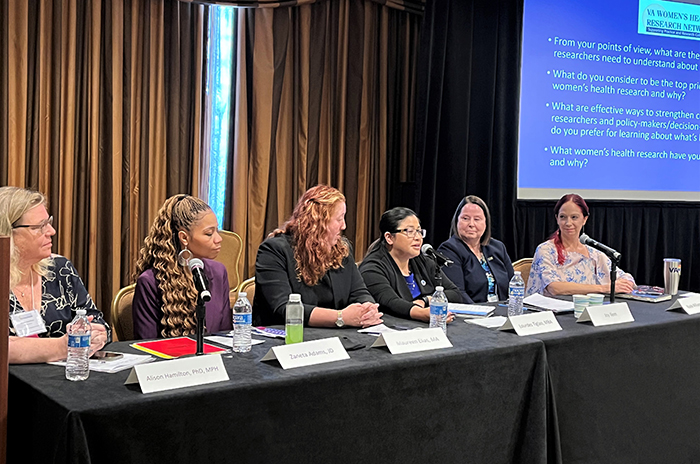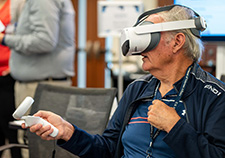Office of Research & Development |
 |
Office of Research & Development |
 |


In a new initiative, VA’s Million Veteran Program is attempting to learn more about mental health conditions that are under-represented among its volunteers, such as opioid use disorder, schizophrenia, and bipolar disorder. (Photo for illustrative purposes only. ©iStock Chee Gin Tan)
April 9, 2021
By Mike Richman
VA Research Communications
"The potential for MVP MIND to impact our understanding of neuropsychiatric disorders, especially those often experienced by our Veteran population, is virtually endless."
VA’s Million Veteran Program, one of the world’s largest databases of health and genetic information, has published influential papers on genetic risk for a number of mental health conditions, including PTSD, anxiety, and substance use disorders. Some mental illnesses, such as opioid use disorder, schizophrenia, and bipolar disorder, have not been as well-represented among MVP volunteers.
Leaders of the Million Veteran Program (MVP) are addressing this gap through a new initiative called MVP MIND. It will survey 50,000 new participants with serious mental health conditions about their experiences. MVP officials believe such efforts will lead to more powerful research into these issues and better treatments.

Million Veteran Program director speaks at international forum

2023 VA Women's Health Research Conference

Self-harm is underrecognized in Gulf War Veterans

Virtual reality technology helps Veterans in pain
The survey will validate and add to medical record data and also complement genetic data. The researchers hope it will yield new insights on depression, mania, suicidality, schizophrenia-psychosis, PTSD, social phobias, and other disorders.
Dr. Sumitra Muralidhar, the director of MVP, explains that increasing knowledge of the genetics behind mental health disorders is critical for developing proper treatments.
“While MVP already has many participants enrolled who experience these conditions,” she says, “we felt it’s important to collect more information through a survey on their mental health and lifestyle. Doing so will improve the ability of researchers to do studies that will not only add value to the literature but importantly could lead to new clinical trials and impact clinical care. Increasing the number and diversity of this group of Veterans, as well as increasing the data available to researchers through the survey, will enhance our ability to do cutting-edge science.”
Many illnesses and diseases have a biological element, as well as behavioral and lifestyle components, Muralidhar notes. She says MVP has a special ability to investigate these details by combining a person’s health record information with data from self-reported surveys and one’s genetic background. In addition, she says, the MVP cohort is racially and ethnically diverse at about 19% Black and 7% Hispanic. Researchers can thus look for links between these sources of information and the occurrence of disease in large and diverse groups of people.
Currently, MVP has more than 830,000 participants in its climb to 1 million and beyond. For this new endeavor, 50,000 new participants diagnosed with serious mental illnesses will be enrolled, mainly at VA medical centers that recruit MVP participants. Currently, there are about 50 such sites.
As Muralidhar sees it, mental health and substance use disorders are important issues to address using the MVP database, as they affect many Veterans and can have huge negative impacts on their lives and those around them. For example, the RAND Corporation, a non-partisan research organization, indicated that about 18.5% of Veterans who served in Iraq or Afghanistan experience PTSD or depression. VA’s National Center for PTSD says almost one out of every three Veterans seeking treatment for substance use disorder also has PTSD.
MVP MIND was created in response to the Commander John Scott Hannon Veterans Mental Health Care Improvement Act of 2019, which called for improving Veteran access to mental health services. MVP is collaborating on the new initiative with VA’s Clinical Science Research and Development Service (CSRD), which is part of VA’s Office of Research and Development. CSRD, which works to move ideas from scientific discovery to clinical application, is funding the pilot work for the new program.
“The potential for MVP MIND to impact our understanding of neuropsychiatric disorders, especially those often experienced by our Veteran population, is virtually endless,” says Dr. Theresa Gleason, director of CSRD. “With in-depth assessments and genetic information, we look forward to the special contributions this effort will make.”
Prior to the national launch of MVP MIND, the survey will be tested at two VA sites to examine the process for completing it virtually and in-person. The pilot survey includes questions about demographics and health and medical history, such as whether a Veteran has been diagnosed with a mental health or substance abuse problem. MVP staff will be available to help the participants complete the survey.
MVP MIND enrollees, Muralidhar notes, will not benefit directly from participating in the new endeavor. But their participation can help researchers better understand mental health conditions and ultimately improve diagnosis, prevention, and treatment.
“In order to turn the dial on making new treatment discoveries, such as druggable targets, we need to have the full scope of information, including the assessments, medical record data, and genetic sample that this project will generate,” Gleason says. “The program is positioned to be a major innovation in getting VA set up to identify pathways to new treatments.”
VA Research Currents archives || Sign up for VA Research updates